CO4CITIES Fourth Transnational meeting, Cluj-Napoca, February 22-23, 2022
Edited on
15 April 2022Cluj-Napoca hosted the fourth Transnational Meeting on February, 22nd and 23rd 2022
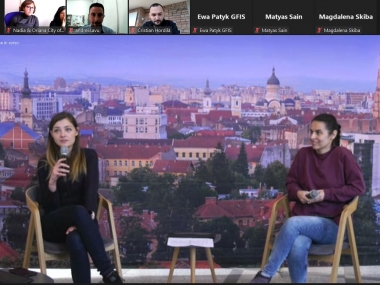
The meeting took place in hybrid mode: interactions from the Cluj-Napoca team's studio, guest speakers, and short pre-filmed videos to show. The first morning started with an Icebreaker survey on Cluj-Napoca specificities and peculiarities, then the team presented the Cluj Napoca context regarding civic spaces and the issue of co-governance.
In Cluj-Napoca, Co4cities aims to advance the development of co-governance models aimed at creating a context for youth innovation and helping youngsters develop their projects and business ideas, connected to the city's innovation ecosystem. The two pilot spaces presented during the session were the former bricks restaurant and the Neighborhood City Halls. The former bricks restaurant is a panoramic location over the Somes river which has been unused for the last four years. Ample reconditioning is necessary, especially in the kitchen and back areas. Despite that, the space fits for co-working, experimentation, and innovation hub for youth. The Neighborhood City Halls are offices spread around the city that used to provide services that now no longer need a physical space due to the digitization process. This process allows rethinking the use of those spaces with a dual purpose: an interface with the citizens, and an interface between the citizens in Cluj Napoca's densest neighborhoods.
Virtual visits to Cluj-Napoca locations were made and they were shown to the participants through some videos. The first video showed the before and after refurbishing investments for the Casino, Cinema Dacia, and Cinema Marasti. The Casino now hosts free art exhibitions as a public space, and Cinema Dacia is an exhibition space allowing free entrance as a public space. It’s a neighborhood catalyst, a place considered very representative by the community. Cinema Marasti acts as an antenna to collect community inputs and impressions.
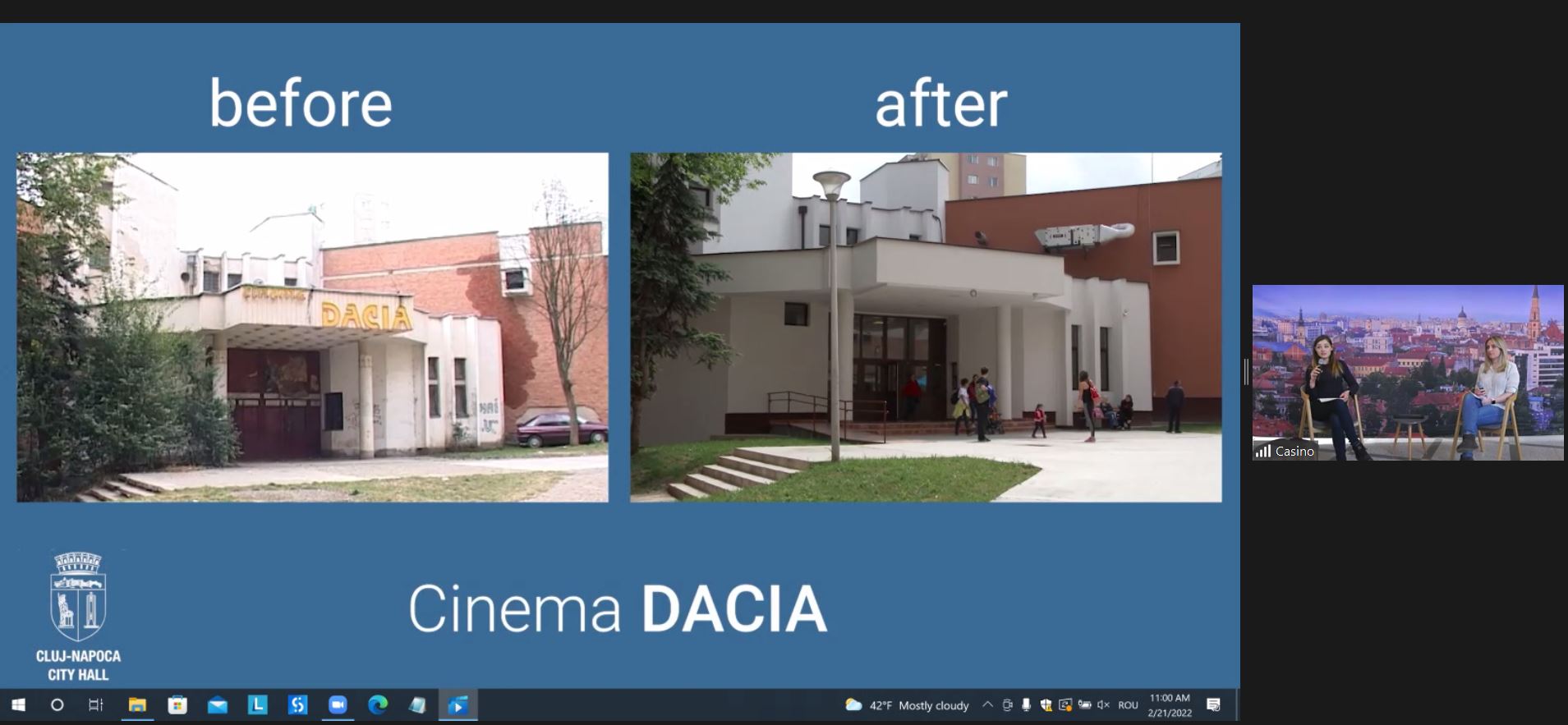
Cristian Hordila, the director of the Transilvania International Film Festival, illustrated the case of Cinema Victoria as an example of good collaboration with the city. Cinema Victoria is co-managed thanks to a bilateral agreement between the Victoria Film Association and the Municipality, the project started from a spontaneous proposal discussed and voted on in the City Council. This pact made it possible not to alienate the building and to benefit from the organization’s financial capacity to modernize the cinema. The agreement was signed in 2011 and was valid for ten years, currently it has been extended for another five years. The collaboration works well and has some restrictions such as: maintaining the same intended use of the spaces, the obligation to have a fixed number of free screenings for owners and children, and the obligation to report on budget management.
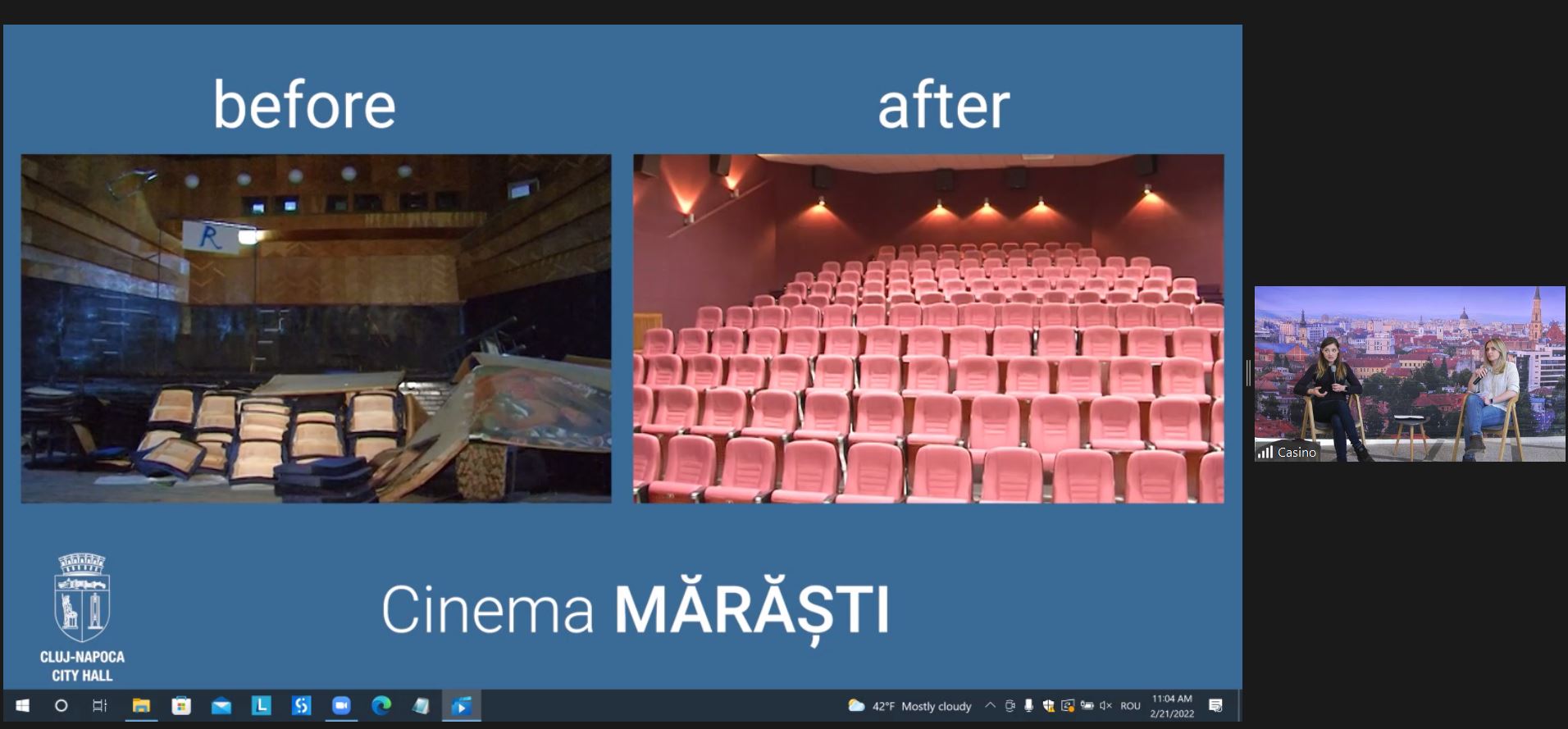
Cluj-Napoca's team showed a video of the former bricks restaurant, a large space with problems and opportunities. Emilia Botezan of the department of International Affairs of Cluj-Napoca Municipality explained that the area is 700 square meters and is part of a historic building in the city. Currently, there are various ideas for the use and management of the space as an alternative meeting place. A discussion has begun on the possibilities of co-management, how the municipality wants to relate to investors, how to create a friendly space, how to involve different stakeholders, and how digitization and technology can help make better use of the space.
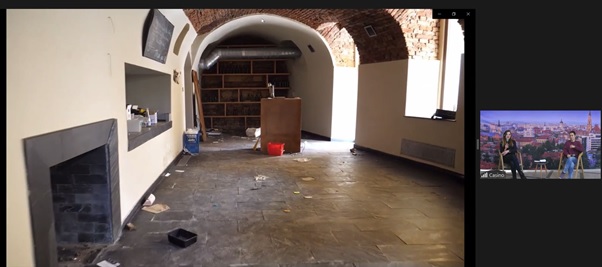
After the first part of the morning, a peer review session began. The discussion focused on the issues that emerged in Cluj-Napoca's ULG and the contents to include in the investment. The themes that emerged from the two pilot projects are the possible functions of the locations, the needs of citizens, and which funds to use. Another significant issue is the integration of migrants, seeing them not as a problem but as a resource within the co-design project.
The meeting then continued with the analysis of five key aspects concerning local projects and the investment plan. On these questions, the partner cities worked on the Miro board starting from their individual experiences, reflecting on the following questions:
- challenging time: the CO4CITIES project will end soon;
- trust;
- pilot project mindset: how to keep the process as open as possible;
- organizational capacity: what kind of competence to have;
- challenging budget predictability
The second morning, the session started with an analysis of the significant insight from the previous day. The participants highlighted the importance of political commitment in generating and facilitating innovative processes and improving the lack of interdepartmental cooperation. They also emphasized the importance of creating dynamic and resilient services through a framework of trust to create a flexible framework inside a complex bureaucratic/legal system. Participants also elaborate on the idea of "extended" city halls - more flexible and shared - creating in-between informal spaces (such as Neighborhood Houses).
The session continued with a review on the state of the Investment Plans.
Cluj-Napoca is developing its Investment Plan on two different layers: an overarching framework on governance mechanisms, and the two pilot projects (former bricks restaurant and the Neighborhood of City Hall).
Having two pilots with different contexts is the key to finding cohesive and replicable solutions. The ambition of the investment plan is to make the pilot replicable and turn it into a protocol and regulation to be able to offer the former bricks restaurant and the City Halls in a fully functional way giving future guidance to find sources and in involving different stakeholders. From a financial point of view, the first pilot has the renovation of the spaces cost covered but needs investors for the equipment and the digitalization. The reason is not covered is to facilitate co-financing processes. To raise the level from pilots to policies the ambition is to formalize a multi-stakeholder dialogue: starting from the pilot and demonstrating that it is possible to create tools to facilitate future processes.
Gdansk’s Investment Plan has two components: Ubocze Street and the Social Cohesion Hub. The pilots will explore the methodologies to work with the community. For Ubocze, the investment allows them to investigate how to work with inhabitants and formulate common plans such as pacts for the community. In addition to this, the Plan includes a renovation budget from the residents and EU funds. The Ubocze case will bring a scalable methodology inside the existing regulations for other public houses.
The investment for the second pilot is already on through public funding. The Plan focuses on the different services that will use the spaces and the pacts of collaboration between various entities to work together.
In Budapest, the Investment Plan focuses on the procedures to use empty spaces owned by the municipality, co-managing them with the third sector (NGOs). The team identified two objectives: to develop the pilot project and to encourage NGOs to co-manage the spaces with the municipality. To achieve this goal, it is necessary to develop a new legal framework to use public spaces that facilitate collaboration between different departments and simplify the bureaucratic process. The ultimate goal is to create an application for NGOs to use the empty property. Due to legal challenges, for the pilot projects, the municipality uses a 30 days permission and is developing a coordinated program together with NGOs.
Turin is working on two different subjects: the feasibility study of the Urban Common Foundation, an innovative tool provided for in the new Urban Commons Regulation, and the Neighborhood Houses. The Springboard Plan will be an instrument to communicate the methodologies - experienced with Co-City - as new paths for the future of the city.
The research focuses on the BeeOzanam building, one of the pacts of collaboration signed during the Co-City project, that has the ambition to become something similar to the Neighborhood House.
The study on the Urban Common Foundation is theoretical research on juridical and normative frameworks and possibilities that will help politicians to have a clearer view of the situation. For BeeOzanam case study, the Springboard Plan includes plans for the future years and investment sources from the Next Generation EU funding scheme.
Subsequently, the session focused on the next steps and identified some topics to further analyze in the forthcoming meetings, such as governance and context of social housing, legal models, governance issues, and interdepartmental cooperation.
Christian Iaione then presented a canvas to analyze the governance and legal aspects of the project. The governance principles, internal governance, external governance, and public governance are fundamental elements for designing the dynamics of the cooperation between the various actors involved. Other aspects that the canvas analyzes are the evaluation mechanisms, the monitoring process, and the constraints/needs. Specific meetings on this topic will subsequently be organized for each partner city.
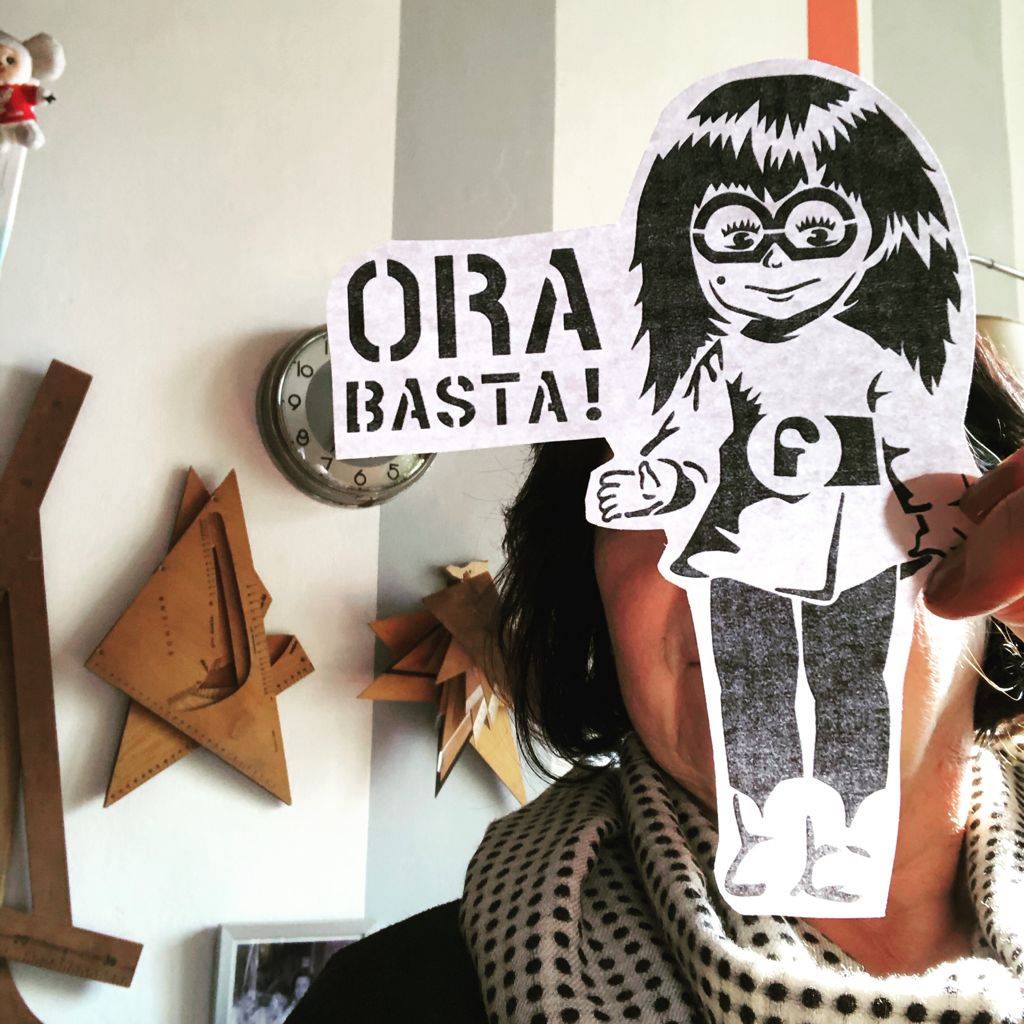 Submitted by Laura Socci on
Submitted by Laura Socci on
